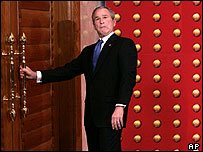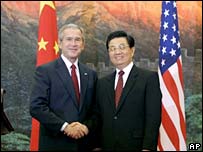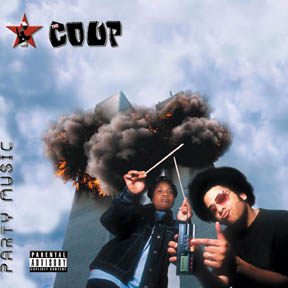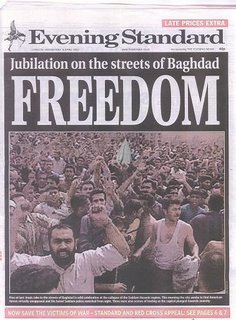Monday, November 21, 2005
The Comedy Murderer posted by Richard Seymour
What, will you murder me? Thou gaoler, thou, I am thy prisoner. The infantilising of politics, the reduction of dissent to weak graffiti-satire (invariably portrayed as savage critique), the obsession with personalities, the gigantism in which relatively minor facts are inflated well above their true value. How could these be more amply portrayed than in this story? Isn't it satisfying? Doesn't it show Bush for the inept clown that you suppose he is? What fun! Crazy guy, crazy country.
The infantilising of politics, the reduction of dissent to weak graffiti-satire (invariably portrayed as savage critique), the obsession with personalities, the gigantism in which relatively minor facts are inflated well above their true value. How could these be more amply portrayed than in this story? Isn't it satisfying? Doesn't it show Bush for the inept clown that you suppose he is? What fun! Crazy guy, crazy country. And yet, what is Bush doing in this story, aside from discovering a locked door (doh! the rest of humanity exists on an ethereal plane where such misfortune could never happen)? He is, if I am not very much mistaken, doing business with a hideous dictatorship. One which has WMDs, moreover. Further, it has invaded its neighbours. Well, Bush does the usual routine: liberalisation (free trade), democratisation (free markets) and openness (fill in blank) are the order of the day. But Bush understands, of course. His country has been doing the same thing since Manifest Destiny. It's just peculiar that this thought never occurred to the BBC's finest minds, that's all. Somehow, "Bush is a hypocrite and blood-stained liar" became translated as "*giggle*, look at how foolish Bush is, he got the wrong door!"
And yet, what is Bush doing in this story, aside from discovering a locked door (doh! the rest of humanity exists on an ethereal plane where such misfortune could never happen)? He is, if I am not very much mistaken, doing business with a hideous dictatorship. One which has WMDs, moreover. Further, it has invaded its neighbours. Well, Bush does the usual routine: liberalisation (free trade), democratisation (free markets) and openness (fill in blank) are the order of the day. But Bush understands, of course. His country has been doing the same thing since Manifest Destiny. It's just peculiar that this thought never occurred to the BBC's finest minds, that's all. Somehow, "Bush is a hypocrite and blood-stained liar" became translated as "*giggle*, look at how foolish Bush is, he got the wrong door!"Ironically, despite earlier anti-China propensities, Bush is positioning himself in relation to China in exactly the fashion that Clinton did. It reflects the interests of the US ruling class - on the one hand, Wal Mart and semiconductor manufacturers, plastic bag makers, and other operations focused on medium to low-level consumer goods see big labour and consumer markets in China; on the other, they also see a big competitor looming over the horizon. China is potentially a major rival for the provision of basic commodities, and also a growing military power.
 Similarly, Bush - an 'isolationist' in opposition - is pursuing Clintonite foreign policy rhetoric and prerogatives (Clinton, who bombed Iraq but didn't invade, cannot bring himself to say that the invasion was wrong - merely that it was badly carried out). And Bush is also pursuing a more aggressive version of Clinton's right-wing domestic policies. One very revealing irony is that one formerly left-wing critic of the Clinton administration is willing to defend Bush while he does exactly what Clinton did, only worse.
Similarly, Bush - an 'isolationist' in opposition - is pursuing Clintonite foreign policy rhetoric and prerogatives (Clinton, who bombed Iraq but didn't invade, cannot bring himself to say that the invasion was wrong - merely that it was badly carried out). And Bush is also pursuing a more aggressive version of Clinton's right-wing domestic policies. One very revealing irony is that one formerly left-wing critic of the Clinton administration is willing to defend Bush while he does exactly what Clinton did, only worse.The position on China reflects one the tensions in imperial planning in the US. On the one hand, China is a rapidly growing power which, according to the American international relations analyst John Mearsheimer, could "be much wealthier than its Asian rivals", its huge population base enabling it to "build a far more powerful army than either Russia or Japan could". China "has the potential to be considerably more powerful than even the United States." (JJ Mearsheimer, “The Tragedy of Great Power Politics”, New York, 2001). This has the neoconservatives of the PNAC reaching desperately for that window of opportunity supplied by the end of the Cold War and the absence of a major geopolitical rival, to assert American power for a much more sustained period. This partly explains the aggressive policies toward China in the early Bush administration. On the other hand, there is money to be made and the economy could well do with a hot cash injection. Besides, as Joseph Nye - a major IR theorist and Clinton's former assistant secretary of defense - explains, China might be much more easily won over by 'soft power' (he coined the term) than military projection. He cites a Chinese activist who uses lawsuits to undermine the dictatorship, saying "We've seen a lot of Hollywood movies - they feature Weddings, funerals, and going to court. So now we think it's only nature to go to court in your life". (Joseph S Nye jr., Soft Power: The Means to Success in World Politics, 2004, p 12).
 Nye first formulated his theories of 'transnationalism' and 'soft power' in the 1970s, and he was not alone. There was a serious and sustained crisis of US imperialism following the Indochina subventions, and many theorists wanted to understand power in international relations in terms that didn't merely reduce everything to the military power of states in the old realist fashion. Nye, John Burton and several others began to conceive of IR as a cobweb of relations between different sources of authority and agency - not merely states, but multi-national companies, NGOs, trade unions, pressure groups, cultural flows etc. 'Soft power' involved the notion that there was no necessary hierarchy of powers: a military pygmy could become an economic giant and begin to threaten in this way. Cultural incursions could erode polities. Again, not to be reductionist, but this was in a time when Nemesis arrived in the US economy in the form of Japanese car manufacturers, and when 1968 had spread its political contagion to Berkeley and other hated citadels of insurrection. People listened to Nye et al, by the way. John Burton moved to Virginia to study world-systems in a behaviourist fashion, while the US government began to pursue soft-power strategies while relegating violence to covert, low-level activities. Hence, during the 1970s, Chile was flooded with Disney films (they are evil), while the Nixon administration did its best to orchestrate an eventually successful coup.
Nye first formulated his theories of 'transnationalism' and 'soft power' in the 1970s, and he was not alone. There was a serious and sustained crisis of US imperialism following the Indochina subventions, and many theorists wanted to understand power in international relations in terms that didn't merely reduce everything to the military power of states in the old realist fashion. Nye, John Burton and several others began to conceive of IR as a cobweb of relations between different sources of authority and agency - not merely states, but multi-national companies, NGOs, trade unions, pressure groups, cultural flows etc. 'Soft power' involved the notion that there was no necessary hierarchy of powers: a military pygmy could become an economic giant and begin to threaten in this way. Cultural incursions could erode polities. Again, not to be reductionist, but this was in a time when Nemesis arrived in the US economy in the form of Japanese car manufacturers, and when 1968 had spread its political contagion to Berkeley and other hated citadels of insurrection. People listened to Nye et al, by the way. John Burton moved to Virginia to study world-systems in a behaviourist fashion, while the US government began to pursue soft-power strategies while relegating violence to covert, low-level activities. Hence, during the 1970s, Chile was flooded with Disney films (they are evil), while the Nixon administration did its best to orchestrate an eventually successful coup.So what we appear to have is a continuation of the interregnum, in which the multipolar world continues to develop, in fits and starts: and the main division is between those who think the US should rule by pulverising people into red mist; and those who think the US should rule by exploiting people into pink sweat while supplying attractive delusions. What fun. Bush got the wrong door. I bet the White House is wincing its ass off.










